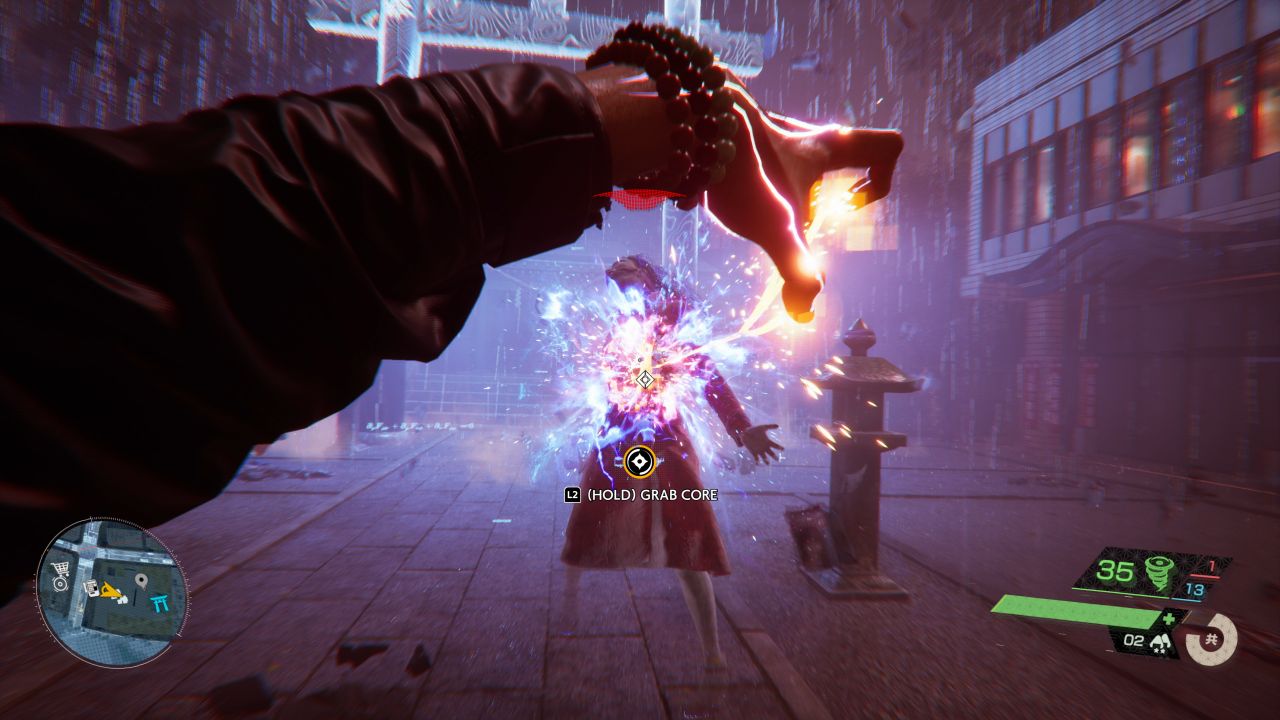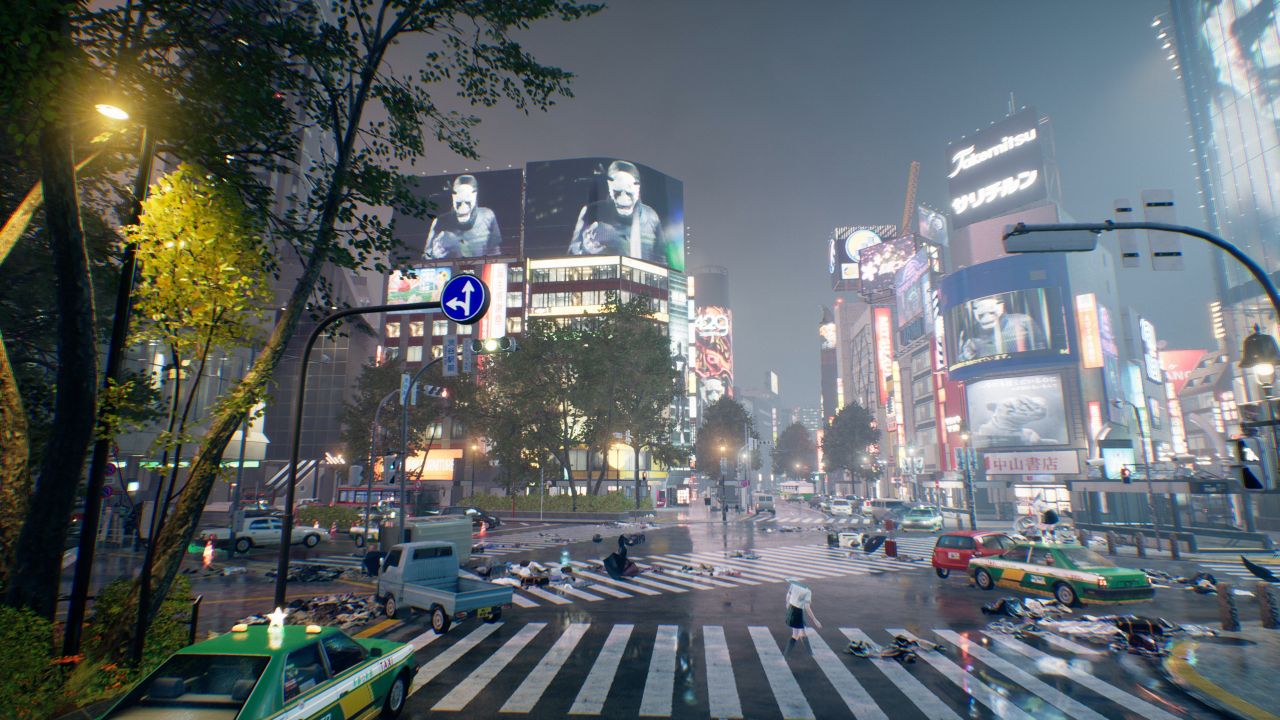It reminded me much less of The Evil Within than I expected. It has a lot of horror elements, don’t get me wrong, but Ghostwire: Tokyo is much more of an action game using the language of horror to convey its themes than the other way around. Rather than spending most of your time on the back foot, creeping around in the hope you can get past a lumbering ball of dead lady limbs with most of your health intact, time in Ghostwire: Tokyo is more likely spent one-shotting headless demon schoolgirls with a bow and arrow. The general vibe, if not the specifics, reminded me a lot of classic, thundering 90s and 00s action films like Blade. So, in other words, Ghostwire: Tokyo looks rad as hell. Even better, it’s also unashamedly strange. The arrows are a restricted resource, in fairness, and though you will have other weapons at your disposal, the bow was the only one I saw in my presentation. Most of the time, protagonist Akito will be using a kind of ghost-hunter martial art called Ethereal Weaving, using his hands to launch elemental attacks, deflect and parry, and pull the core out of spirits’ chests as if he were tugging out their heart with a piece of gold string. As you can see in the showcase above, it looks well cool. This all comes with the caveat that what I saw was a highly curated, pre-recorded bit of game that I didn’t get to touch, so it might conceivably play like a bin that you haven’t emptied for three weeks (so you’re, like, kind of squishing down the stuff already in the bin to tip in your left over pasta). But by heck I’m excited to find out! The premise is that a spectral fog has swept through Tokyo and now nobody is left in it. Indeed, there are clothes in the street where people have vanished. It’s impossible not to see a parallel to the pandemic at the height of lockdown, where a step out of your front door for your daily mandated walk saw you enter a strange ghost town, like Cillian Murphy at the start of 28 Days Later. But there’s also a whiff of Damon Lindelof’s The Leftovers in here, and, if you’re a fan of death-game shows, Alice In Borderland. The Tokyo of Ghostwire: Tokyo is not entirely empty, though, as it has been repopulated by Yokai - vengeful spirits who you have to defeat. Akito has been possessed by the spirit of an experienced ghost hunter, who chats in Akito’s ear throughout the game, giving him exposition, tips and encouragement. The plot is that there’s some kind of mastermind who has brought this calamity to Tokyo. As Tango Gameworks made plain last night, the city’s mix of tight alleys and open plazas open up plenty of potential for some open-world-ish antics, as well as some scripted setpieces along the way. But I’m less interested in the story than I am in everything else. We didn’t see much high-flying traversal via the game’s friendly, rooftop Tengu spirits you can grapple onto, but we did see some zone clearing (via cleansing corrputed Torii Gates) and what looked like some early story quests. The impression I got was that there’s a mix of linear set pieces and a few open areas to explore. But within the exploration we saw, there were just so many cool, odd things - often mentioned just as asides! The enemy design is as memorable as you’d expect from The Evil Within studio. They’re all faceless businessmen holding umbrellas, or the aforementioned headless school girls. Women with very long arms and big scissors. And there are no health bars or floating numbers; rather, it seemed that the strength or health of enemies was indicated by, for example, their umbrellas being tatty and torn vs. whole and smart. It’s Monster Hunter Rise by way of Japanese folk horror. Some areas were also choked by a big, pulsating web of fungi-like black corruption, cleared by destroying the “Heart” of the corruption. In pursuit of one goal, Akito had to search an apartment that was being turned upside down and sideways like something out of Inception - an Utena Space, in the game’s lingo, and just one of several in the game. Later he chased down a spirit that had stolen another spirit’s toy. This allowed the spirit of a grandmother to pass on, knowing that her grandaughter wasn’t sad anymore. There’s potential for little stories like this to become repetitive, but my hope is that they’re varied and all equally odd. Tokyo’s former residents are floating around as trapped ghosts, and can be sucked up into paper katashiro dolls, and then sent outside the city limits (where they will be normal people again) via payphones. The convenience stores where you can buy supplies (including more katashiro) are now staffed by Yokai in the form of floating cats. To highlight supernatural things, Akito makes a gesture that kind of drops a golden thread, making a noise like a loud drop of water, and it was an image and sound I found had been tattooed to my brain after the preview. And yeah, to cycle back, the combat looks cool. You can level up different elemental attacks, or even sneak and do quick stealth kills. There will be boss fights every now and then, too, but we don’t know what form they will take just yet. I like that the idea seems to be a normal kind of dude becoming a hero and cleaning up this ghost town like a latter day Egon Spengler. It’s a heady fantasy, to be unafraid in a creepy and literally haunted setting. And the backdrop - a city that is most often depicted in pop culture as specifically being very full of people, now uncannily empty - is inherently unsettling. But what excites me most about Ghostwire: Tokyo is that it seems prepared to just do loads of weird, strange stuff and not bother to really explain it. Who cares how you can send ghosts through the telephone? That’s just how ghost rules work. Deal with it. Yeah, why wouldn’t a ghost hunter use a bow and arrow? That makes perfect sense! Is it as weird as the average solo-dev eyeball-themed text adventure on Itch? Probably not. But this is all exactly the kind of thing I wish studios were allowed to spend decent budget and manpower on more often. I don’t want loads of sequels and Disney properties, I want people to make action-adventure games with a load of ghost-heart-tearin’ new ideas and inspirations. Really let ’em rip! So if Ghostwire: Tokyo is as good as it looks, I can only hope Tango Gameworks don’t make a sequel.


